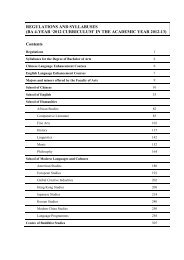Bachelor of Arts (BA) - The University of Hong Kong
Bachelor of Arts (BA) - The University of Hong Kong
Bachelor of Arts (BA) - The University of Hong Kong
Create successful ePaper yourself
Turn your PDF publications into a flip-book with our unique Google optimized e-Paper software.
154ENGL2043.Twentieth century American women's writings: Awakenings (6 credits)Beginning with Kate Chopin's provocative novella, <strong>The</strong> Awakening, a story <strong>of</strong> both personal liberationand destruction, this course will explore the many complex awakenings - literary, personal, political,familial, social – that American women experienced during the course <strong>of</strong> the twentieth century. In closereadings <strong>of</strong> a variety <strong>of</strong> texts, including novella, short stories, poetry, and essays, the class will engagefeminist theory as a tool for uncovering how these American women imagined themselves during theturbulent changes <strong>of</strong> the twentieth century.Assessment will be by 60% coursework, 40% examination.ENGL2044.Shakespeare with Asian faces: Cinematic adaptations <strong>of</strong> Macbeth, King Lear,Hamlet, and Romeo and Juliet (6 credits)This course will look at cinematic interpretations <strong>of</strong> Shakespeare in Asian and Asian American settings.We will study four tragedies by Shakespeare and then watch a number <strong>of</strong> film adaptations, includingfilms by Akira Kurosawa, Chen Kai-ge, and Andrej Bartkowiak. We will examine the ways in whichour knowledge <strong>of</strong> these tragedies enhances our appreciation <strong>of</strong> these films and the ways in which thesefilms tell us what is unique or "untranslatable" about Shakespeare.Assessment will be by 100% coursework.ENGL2051.Critical and creative approaches to English (6 credits)For any creative writers - writers <strong>of</strong> poetry, fiction, drama - from outside the Anglo-American world,English has a complex history and <strong>of</strong>ten an uneasy relationship, with native languages. <strong>The</strong> decision, orthe choice, to write and publish in English, is an issue they have reflected upon and debated, nationallyand internationally, with other writers. Such reflections and debates constitute one <strong>of</strong> the dynamiccontours <strong>of</strong> "Global English" as a discourse. Critical questions <strong>of</strong>ten raised in the debate concern theEnglish language as the bearer <strong>of</strong> cultures. <strong>The</strong>y include the changing roles <strong>of</strong> English as a colonial orpostcolonial language, as the language <strong>of</strong> the unitary or pluralistic nations, as a dominant or minoritylanguage, as the language <strong>of</strong> 'English literature' or 'Literature in English'. In this course, students will beintroduced to these questions through discussions <strong>of</strong> essays by writers who have considerable practicalexperience using English as the language <strong>of</strong> creativity, and who are active contributors to debates aboutEnglish in their own locations.Assessment will be by 50% examination, 50% coursework.EUROPEAN STUDIES<strong>The</strong> Programme in European Studies provides an interdisciplinary approach to the study <strong>of</strong> Europeancivilization. Rather than being based in a single department, the Programme is administered through theFaculty <strong>of</strong> <strong>Arts</strong> by a Board <strong>of</strong> European Studies comprised <strong>of</strong> representatives from ten departments andthe Language Centre. Both rigourous and flexible, the Programme enables students to tailor theirstudies to suit their individual aims; students can develop the necessary skills for a wide range <strong>of</strong>pursuits related to the politics, history, culture, and economy <strong>of</strong> Europe.To major in European Studies, a student must take the three European Studies Core Courses(EUST1001, EUST2001, EUST3001); three years <strong>of</strong> a Core Language (French, German, Italian, orSpanish); and a minimum <strong>of</strong> twenty-four credits from an approved list <strong>of</strong> second- and third-yeardepartmental courses (see below). In exceptional cases, a particular requirement may be waived. AnyEuropean Studies student who successfully fulfills the requirements <strong>of</strong> the major in French or the minorin French, German, Italian, or Spanish will be deemed to have satisfied the language requirement <strong>of</strong> theEuropean Studies major. In such a case, the student will be required either to take a second language inplace <strong>of</strong> the first, or to increase the load <strong>of</strong> departmental courses from 24 credits to 48 credits.
















